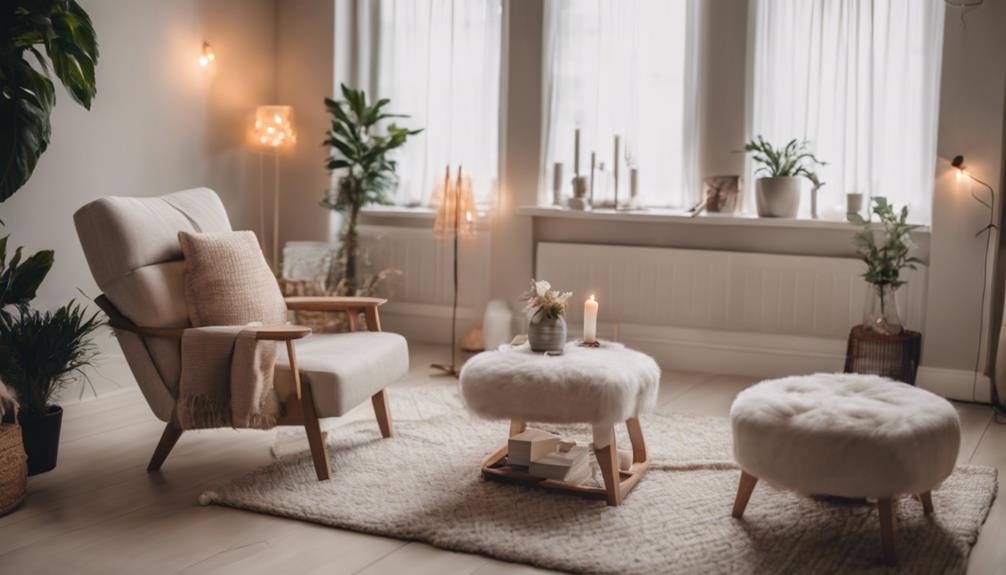Hypnotherapy is a powerful tool for easing anxiety by accessing the subconscious mind and addressing stress sources. Seek a qualified hypnotherapist, discuss expectations, and prepare mentally for sessions. Add self-care practices like mindfulness and deep breathing to daily routines. Keep a journal to monitor progress and adjust techniques accordingly. Opt for a holistic approach to sustain long-term mental well-being and support mental health. Hypnotherapy empowers individuals to manage anxiety effectively and develop tools for healthier living.
Understanding Hypnotherapy for Anxiety

Hypnotherapy for anxiety involves utilizing guided relaxation techniques to access the subconscious mind and address underlying sources of stress and worry. Contrary to common misconceptions, hypnotherapy is not about losing control or being manipulated. It is a collaborative process between the therapist and the individual, focusing on tapping into the mind-body connection to promote healing.
Anxiety triggers vary from person to person and can stem from past experiences, learned behaviors, or even genetic predispositions. Through hypnotherapy, these triggers can be identified and addressed at a subconscious level, allowing individuals to develop healthier coping mechanisms and reduce the intensity of their anxious responses.
The hypnosis process typically begins with inducing a state of deep relaxation, where the individual is more open to suggestion and visualization. This heightened state of awareness enables the therapist to guide the individual in reframing negative thought patterns, building resilience, and fostering a sense of inner calm.
Benefits of Hypnosis for Anxiety
When considering the benefits of hypnosis for anxiety, individuals may find a profound sense of relief and empowerment in addressing their emotional struggles. One common misconception about hypnosis is that it involves losing control or being manipulated, but in reality, it is a collaborative process where the individual remains in charge and can choose to discontinue the session at any time.
The benefits of hypnosis for anxiety are multifaceted. Through self-hypnosis techniques, individuals can learn to tap into their subconscious mind, where deep-seated anxieties often reside. By accessing this level of consciousness, individuals can reframe negative thought patterns, cultivate a sense of calm, and develop coping strategies for managing anxiety triggers.
Research has shown the effectiveness of hypnosis in reducing anxiety symptoms, with many individuals experiencing significant improvements in their overall well-being. The personalized nature of hypnotherapy allows individuals to address specific anxiety issues tailored to their unique needs, fostering a sense of control and empowerment in their journey towards anxiety relief.
Setting Realistic Expectations

Understanding the process of setting realistic expectations is key when considering the potential outcomes of utilizing hypnosis for anxiety relief. Managing stress is a significant component of anxiety management, and hypnotherapy can be a valuable tool in this regard.
When setting expectations for hypnotherapy, it's essential to recognize that while it can be highly effective for many individuals in reducing anxiety symptoms, it may not completely eliminate all feelings of anxiety.
Coping strategies are an integral part of managing anxiety, and hypnotherapy can help individuals develop new coping mechanisms and tools to navigate their anxious thoughts and emotions.
Finding a Qualified Hypnotherapist
Locating a skilled and reputable hypnotherapist is a crucial step in achieving effective anxiety relief through hypnotherapy. When seeking a hypnotherapist, it is essential to consider their qualifications and background in hypnotherapy. Look for practitioners who have received proper training and certification from reputable institutions. A qualified hypnotherapist should have completed comprehensive education in hypnotherapy techniques and possess a deep understanding of the mind-body connection.
To find reputable hypnotherapists, start by researching online directories, professional associations, or seeking recommendations from trusted sources such as healthcare providers or friends who have undergone successful hypnotherapy treatments. Reading reviews and testimonials can also provide valuable insights into the hypnotherapist's reputation and effectiveness in treating anxiety disorders.
Additionally, consider scheduling initial consultations with potential hypnotherapists to discuss your specific needs, ask about their experience in treating anxiety, and gauge your comfort level with them. Building a trusting and collaborative relationship with a qualified hypnotherapist is key to maximizing the benefits of hypnotherapy for anxiety relief.
Preparing for Your Hypnotherapy Session

Prior to your hypnotherapy session, it is essential to adequately prepare both mentally and physically to optimize the effectiveness of the treatment.
Mental preparation plays a crucial role in getting the most out of your session. Engage in relaxation techniques such as deep breathing, meditation, or visualization to calm your mind and create a receptive state for the therapy.
Setting clear session expectations is also vital. Understand that hypnotherapy is a collaborative process where your active participation is key to success.
Additionally, establishing self-care routines before your session can enhance its impact. Ensure you get enough rest, eat a light meal, and avoid stimulants like caffeine to promote relaxation and focus.
Active Participation in the Process
Engaging actively in the hypnotherapy process is paramount to achieving optimal results in alleviating anxiety and improving mental well-being. Self-reflection plays a crucial role in this journey. Before each session, take time to reflect on your emotions, triggers, and areas of concern. This self-awareness will empower you to communicate effectively with your hypnotherapist, enabling them to tailor personalized strategies to address your specific needs.
Active engagement during the hypnotherapy session is equally essential. Be open to the process, follow the therapist's instructions, and allow yourself to relax and embrace the experience fully.
Effective communication with the hypnotherapist is key. Share your feelings, progress, and any insights gained from the sessions. This dialogue fosters a collaborative relationship, ensuring that the techniques used are aligned with your goals.
Incorporating Hypnotherapy Techniques Daily

Utilizing hypnotherapy techniques on a daily basis can significantly enhance the effectiveness of the overall treatment for anxiety relief and mental well-being. Establishing daily practices that incorporate self-care strategies tailored to your specific needs can provide a consistent foundation for managing anxiety.
Begin each day with a relaxation exercise or mindfulness meditation to set a positive tone and promote a sense of calm. Throughout the day, practice deep breathing techniques whenever you feel overwhelmed or anxious, helping to regulate your emotions and reduce stress levels.
Incorporating self-hypnosis sessions into your daily routine can further reinforce positive affirmations and mental imagery to promote relaxation and reduce anxiety symptoms. By dedicating time each day to engage in hypnotherapy techniques, you are actively participating in your own healing journey and nurturing your mental well-being.
Consider creating a quiet, comfortable space where you can focus on these daily practices without distractions, allowing yourself to fully immerse in the therapeutic process. Consistency and commitment to these daily rituals can lead to lasting benefits in managing anxiety and enhancing your overall mental health.
Monitoring Progress and Adjusting
To effectively track your journey towards anxiety relief and mental well-being, it is essential to consistently monitor your progress and make necessary adjustments. Tracking results allows you to see how far you have come and identify areas that may need improvement. Regularly evaluating progress helps you understand what techniques are working well and which ones may need tweaking.
When monitoring your progress, pay attention to both the physical and emotional changes you experience. Keep a journal to record your feelings, thoughts, and any anxiety symptoms you encounter. This documentation can provide valuable insights into your mental state over time.
In addition to tracking results, be open to making changes to your hypnotherapy techniques. If you notice that a certain approach is not yielding the desired outcomes, don't hesitate to adapt and try different methods. Your hypnotherapist can also help you modify the techniques to better suit your needs and preferences.
Practicing Relaxation and Mindfulness
How can incorporating relaxation and mindfulness practices enhance your journey towards anxiety relief and improved mental well-being?
Engaging in mindfulness exercises and deep breathing techniques can be powerful tools in managing anxiety. Mindfulness involves being fully present in the moment, acknowledging your thoughts and feelings without judgment. By practicing mindfulness, you can cultivate a sense of inner peace and reduce the grip of anxious thoughts.
Deep breathing techniques, such as diaphragmatic breathing or belly breathing, can help calm the nervous system and promote relaxation. When you feel anxious, taking slow, deep breaths can signal to your body that it is safe and lower your stress levels.
Combining mindfulness exercises with deep breathing techniques can create a synergistic effect, enhancing your ability to cope with anxiety and promoting a sense of overall well-being.
Long-Term Maintenance and Support
Sustaining long-term mental well-being requires consistent effort and a multifaceted approach that encompasses ongoing support and maintenance strategies.
In addition to hypnotherapy sessions, incorporating self-care practices into your daily routine can be instrumental in maintaining anxiety relief. Engaging in activities that promote relaxation, such as yoga, meditation, or spending time in nature, can help manage stress levels and prevent anxiety from resurfacing.
Coping strategies play a crucial role in long-term maintenance as well. Developing healthy coping mechanisms, such as deep breathing exercises, progressive muscle relaxation, or cognitive reframing, can empower individuals to effectively navigate challenging situations without feeling overwhelmed by anxiety.
It is also essential to build a strong support system comprising friends, family, or mental health professionals who can provide encouragement and guidance when needed.
Frequently Asked Questions
Can Hypnotherapy Help With Specific Phobias and Panic Attacks?
Hypnotherapy is an effective treatment for specific phobias, providing tailored interventions to address underlying causes. It offers relief for panic attacks by guiding individuals to reframe thoughts and responses, promoting relaxation and resilience.
What Is the Average Duration of a Hypnotherapy Session for Anxiety?
The average duration of a hypnotherapy session for anxiety typically ranges from 60 to 90 minutes. Sessions focus on using various techniques tailored to the individual's needs to maximize effectiveness while ensuring client comfort and safety.
How Do I Know if Hypnotherapy Is the Right Choice for Me?
When considering hypnotherapy as a treatment option, conducting a personal assessment can help determine its suitability for you. Compare its benefits and risks with alternative treatments, research its efficacy, and consult with a qualified professional for guidance.
Are There Any Potential Side Effects or Risks Associated With Hypnotherapy?
Potential drawbacks and risks of hypnotherapy include temporary dizziness, headaches, or heightened emotional responses. Rarely, individuals may experience false memories or increased anxiety. It is crucial to work with a trained professional to minimize any potential side effects or dangers.
Can Hypnotherapy Be Combined With Other Forms of Therapy for Anxiety?
Hypnotherapy can be effectively combined with other forms of therapy for anxiety by harnessing the mind-body connection. An integrative approach can enhance treatment outcomes by addressing anxiety from multiple angles, offering holistic support for individuals.
Conclusion
In conclusion, hypnotherapy can be a valuable tool for managing anxiety when used in conjunction with other therapeutic approaches.
It is important to find a qualified hypnotherapist, set realistic expectations, and actively engage in the process to see benefits.
By incorporating hypnotherapy techniques into daily practice, monitoring progress, and maintaining long-term support, individuals can effectively reduce their anxiety and improve their overall well-being.


